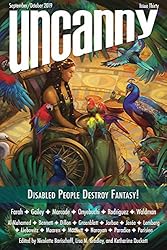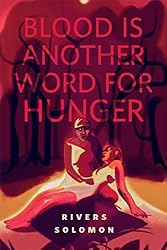SHORTS is our column exploring free and inexpensive short fiction available on the internet. We’ve previously reviewed most of the novellas, novelettes and short stories that are currently nominated for the 2020 Hugo Awards. Here are our reviews for the remaining nominees. Reviews for the Retro Hugo short fiction nominees are coming this week!
 Away with the Wolves by Sarah Gailey (2019, free at Uncanny Magazine, $3.99 Kindle magazine issue). 2020 Hugo award nominee (novelette).
Away with the Wolves by Sarah Gailey (2019, free at Uncanny Magazine, $3.99 Kindle magazine issue). 2020 Hugo award nominee (novelette).
![]() Suss is a young woman who lives with chronic pain. She’s also a werewolf, and it’s only in wolf form that she can be pain-free. Her late mother always told her that spending too much time as a wolf was selfish, though, so she resigns herself to brief interludes in that form, living most of her life as a human.
Suss is a young woman who lives with chronic pain. She’s also a werewolf, and it’s only in wolf form that she can be pain-free. Her late mother always told her that spending too much time as a wolf was selfish, though, so she resigns herself to brief interludes in that form, living most of her life as a human.
On waking up after her most recent transformation, Suss learns that a village woman’s goat has been killed, and the woman blames Suss for it. It does appear to be the work of a wolf, and Suss begins to worry that she’s losing control of her wolf-self and will need to give it up for the greater good.
Sarah Gailey gives a vivid portrayal of Suss’s debilitating, unexplained pain. Without using the words “spoon theory” — Suss wouldn’t know the term, after all — Gailey explains it well through the story. It’s contrasted with Suss’s experiences as a wolf, where she might suffer pain if she hurts herself, but it’s pain that makes sense.
The story turns on the moment Suss’s best friend Yana says, “So let’s change it.” Yana’s creative thinking leads to a compassionate, empowering solution to the crisis. It feels applicable not just to this story but to so many other things. What could we change, if we stopped accepting the intolerable as inevitable? ~Kelly Lasiter
![]() I enjoyed Away with the Wolves, though not quite as much as Kelly did. As with much current speculative fiction, diversity is a prominent feature in this story, but it’s an unusual one — Suss’s unexplained severe, chronic pain — and it’s well-integrated and even integral to the plot. Suss loves her time as a wolf, in large part because her pain completely disappears in that form and she’s free to run and explore and feel truly alive. But she feels guilty because of her dead mother’s scolding, and she doesn’t want to lose her connections to her best friend and neighbors. More, there’s the problem of valuable livestock in her village being killed by a canine predator, and Suss worries that she’s losing touch because she has no memory of doing this in her wolf form.
I enjoyed Away with the Wolves, though not quite as much as Kelly did. As with much current speculative fiction, diversity is a prominent feature in this story, but it’s an unusual one — Suss’s unexplained severe, chronic pain — and it’s well-integrated and even integral to the plot. Suss loves her time as a wolf, in large part because her pain completely disappears in that form and she’s free to run and explore and feel truly alive. But she feels guilty because of her dead mother’s scolding, and she doesn’t want to lose her connections to her best friend and neighbors. More, there’s the problem of valuable livestock in her village being killed by a canine predator, and Suss worries that she’s losing touch because she has no memory of doing this in her wolf form.
Sarah Gailey’s writing is engaging: the reader understands Suss’s physical pain and stress, and it feels like these villagers are real people.
Nan is the oldest person either of us have ever known. She tells people that she’s three hundred years old, and I believe her, if only because I don’t know for sure that spite can’t pickle a person into immortality. She’s tall and hale with broad shoulders and all of her original teeth, a fact she’ll tell anyone who will listen.
The central conflict in Away with the Wolves felt like it was resolved a bit too quickly and neatly, but I still enjoyed this warmhearted story and the way it stresses the importance of friendship and interpersonal connections — whether you’re a human or a wolf. Or both. ~Tadiana Jones

![]() “As the Last I May Know” by S.L. Huang (2019, free online at Tor.com, $0.99 on Kindle). 2020 Hugo award nominee (short story).
“As the Last I May Know” by S.L. Huang (2019, free online at Tor.com, $0.99 on Kindle). 2020 Hugo award nominee (short story).
Ten-year-old Nyma is chosen for a singular role in her country: to be the child whose life stands between the president’s decision to deploy devastating seres bombs in the war against their enemy. The only copy of the access codes to the seres missiles are in a capsule implanted next to Nyma’s heart. The law requires that the president personally kill the carrier child with a ceremonial dagger, to retrieve the codes to launch the bombs. Once the new president, Otto Han, is elected, Nyma is always to be near him. And despite President Han’s reluctance to grow closer to Nyma (he initially resists even knowing her name), it inevitably happens, while the war news grows more and more grim.
The theme and issue are clearly stated in this story, multiple times and in varying ways:
Do you truly wish to use such weapons so badly, that you would be willing to do as the law requires and murder a child of your own land with your own hands in order to gain access to them?
It’s pretty good message fiction: what if the government made it really (REALLY!!) hard for the president to pull the plug on deploying nuclear weapons? Is the loss of so many other lives, a belief in the rightness of your cause, the fear that your own country will be devastated if you don’t take action, sufficient? These are difficult questions that both President Han and the reader struggle with, and Huang doesn’t offer an easy answer. What makes it even more difficult is Nyma’s own belief in the necessity of her role, despite her wish to live.
But I can’t quite wrap my brain around the idea of enough people agreeing to create a law that deliberately uses an innocent child as the sacrifice that the president personally needs to take, with his own hands, in order to bomb the enemy. On the other hand, Ursula K. Le Guin‘s famous short story “The Ones Who Walk Away from Omelas,” a thematically similar parable about the ethics of the greater good, also uses an innocent child as an even more inexplicable sacrifice, and I think that story is great. Maybe Huang’s writing style, which is far less subtle, just didn’t engage me as much as Le Guin’s did.
In any case it’s great food for thought, and is a Hugo nominee. ~Tadiana Jones

![]() “Blood Is Another Word for Hunger” by Rivers Solomon (2019, free at Tor.com, $0.99 on Kindle). 2020 Hugo award nominee (short story).
“Blood Is Another Word for Hunger” by Rivers Solomon (2019, free at Tor.com, $0.99 on Kindle). 2020 Hugo award nominee (short story).
During the Civil War, an enslaved teenage girl, Sully, kills the family that owns her. This act “rip[s] a devilishly wide tunnel between the fields of existence” and causes Sully to birth back into existence Ziza, a girl who died many years ago. Ziza is no baby, though, but an adolescent like Sully. The two of them take up residence in the house of Sully’s late masters, and set about turning it into a place of refuge for themselves and for others.
In order to be truly safe there, though, Sully and Ziza will need to kill a lot more people. All of these killings, too, have effects on the spirit world. The murders reached the point of being kind of shocking to me, though it’s also true that anyone who was wealthy in their general vicinity would have been a slave owner and would have done terrible things themselves. The romantic subplot also hit a discordant note with me because, in a sense, one is the other’s mother.
“Blood Is Another Word for Hunger” made me uncomfortable, and I think it’s supposed to, so it did its job. It also made me think, and moved me with its themes of freedom and found family. Rivers Solomon’s writing is evocative, and I plan to read more of their work soon; I have The Deep in my TBR pile and look forward to it. ~Kelly Lasiter
In the American Civil War era, as soon as she hears that the man of the house has died in the war, Sully, a 15-year-old slave, slits the throats of the five women who own her and have mistreated her. That’s not really so surprising, but what happens to Sully next is.
The murder of a family by a girl so tender and young ripped a devilishly wide tunnel between the fields of existence, for it was not the way of things, and the etherworld thrived on the impermissible.
Sully’s anger cuts a path between these two planes of existence, and the spirit of a teenage girl who died long ago rides that path into Sully’s womb and is immediately born in flesh (conveniently and temporarily shrinking down to baby-size for the birthing process). The new girl, Ziza, and Sully get along well, but there are four more lives Sully took that still require balancing, additional revenants who will need more food than their farm can produce, and a nearby town full of people who are bound to come checking on the farm sooner or later.
Sully’s seething anger toward her former owners is understandable. It’s not the initial murders that take me aback here, but the ongoing bloodthirstiness of the tale, which makes for an odd combination with the romance and the hopefulness of the ending. “Blood is Another Word for Hunger” offers some disturbing metaphors for our own day and time. It’s a disquieting tale: a cry of anger and wanting retribution and more from a world that’s never felt fair. ~Tadiana Jones




Just saw you like Jack Vance. Me too. Surely he offends you somewhere though?
Words fail. I can't imagine what else might offend you. Great series, bizarre and ridiculous review. Especially the 'Nazi sympathizer'…
"Nor Iron Bars a Cage by Kage Harper" Freudian slip there. ;)
[…] (Fantasy Literature): In 1957, Hammer Studios in England came out with the first of their full-color horror creations, […]
I'm going to have to find these and read them.